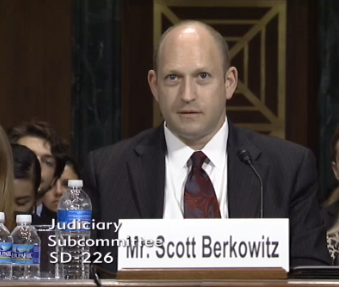 By not conducting DNA testing on evidence from open rape cases, we’re denying justice to hundreds of thousands of rape survivors while leaving communities at risk from serial predators, RAINN president Scott Berkowitz today told a panel of U.S. Senators conducting a hearing on the rape kit backlog. “One of the greatest threats to public safety is the fact that most rapists are never apprehended or punished, leaving them free to commit more crimes with impunity. The rape kit backlog plays a big role in this state of affairs,” he said.
By not conducting DNA testing on evidence from open rape cases, we’re denying justice to hundreds of thousands of rape survivors while leaving communities at risk from serial predators, RAINN president Scott Berkowitz today told a panel of U.S. Senators conducting a hearing on the rape kit backlog. “One of the greatest threats to public safety is the fact that most rapists are never apprehended or punished, leaving them free to commit more crimes with impunity. The rape kit backlog plays a big role in this state of affairs,” he said.
The hearing was convened by the chairman of the Senate Judiciary Committee’s Subcommittee on the Constitution, Senator John Cornyn (R-TX), a long-time champion of programs to eliminate the backlog.
"Each and every untested rape kit represents a victim and their struggle for justice," said Senator Cornyn in his opening remarks.
“We’re grateful that Sen. Cornyn called this hearing to focus national attention on this problem, and we’re committed to working with him and other members of Congress to solve it,” said Berkowitz.
Also testifying was Illinois Attorney General Lisa Madigan, and sexual assault survivor Debbie Smith. The primary federal program to solve the DNA backlog problem is named the Debbie Smith Act, in honor of her tireless advocacy.
In her testimony, Smith told the subcommittee what it was like when she finally heard that her rapist had been identified, due to the testing of her rape kit: “On July 26, 1995, we received news that a DNA cold hit had revealed the name of my rapist. He was already in prison for another crime. The torment was finally over, and I knew where he was. My family was safe.”
Smith also explained what drives her to keep advocating: “And it is for [the victims] that I will continue to do all I can to get these kits off of the shelves of police evidence rooms and in the labs. It is for the victims represented by the letters and news articles in three different boxes that I have that I keep fighting for their right to justice.”
Since the Debbie Smith Act first passed in 2004, Congress has appropriated $1.25 billion in DNA funding. However, according to Justice Department figures, only 51%, or about $638 million, of those funds has been spent to directly test rape kits and ensure labs have the capacity to meet demand, the primary purposes of the program.
Congress in 2013 passed the SAFER Act, which requires the Department of Justice (DOJ) to increase the percentage of funds spent on backlogs to 75%. SAFER also requires DOJ to provide at least 5% of DNA funds to law enforcement agencies to conduct audits of their backlogged rape kits and to provide the data they need to prioritize testing those cases in which the statute of limitations will soon expire. These audits are required to be made public online. DOJ’s National Institute of Justice, however, has yet to implement the requirements of SAFER.
In addition to working on federal DNA policy, RAINN is a partner in the Rape Kit Action Project (RKAP), which works to pass state rape kit audit and testing laws. Last year, with RKAP’s support, five states passed such laws. This year, another 40 bills in more than 20 states are pending.
Watch the full testimony here.
Be part of the solution: Visit RAINN's Action Center and sign up to stay informed about RAINN’s work to eliminate the backlog of untested rape kits, as well as other key policy issues.
If you or someone you know has been affected by sexual violence, it’s not your fault. You are not alone. Help is available 24/7 through the National Sexual Assault Hotline: 800-656-HOPE and online.rainn.org, y en español: rainn.org/es.